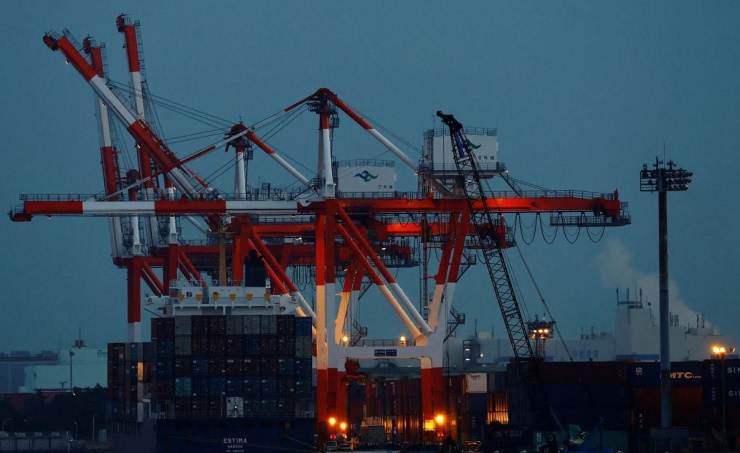
Japan’s exports extended double-digit gains for a third straight month in April, but surging global commodity costs inflated the country’s import bill to a record, adding to worries about the rising cost of living.
Shoring up the prospects of a private demand-led recovery, however, was a gauge of capital expenditure that posted its first monthly gain in three months, Reuters reported.
The mixed data on Thursday followed the yen’s falls to two-decade-lows against the dollar earlier this month, which stoked fears of worsening terms of trade and added financial burdens for the resource-poor Japanese economy as import costs soar.
A weak yen, once considered a boon for the export-led economy, now has less of an impact as shipments grow smaller due to the ongoing shift by Japanese manufacturers to offshore production.
Japan’s exports rose 12.5% in April from a year earlier, Ministry of Finance data showed, led by U.S.-bound shipments of cars, slightly missing a 13.8% increase expected by economists in a Reuters poll. It followed a 14.7% rise in March.
In a worrying sign for the outlook, China-bound shipments fell 5.9% in April, the biggest drop since March 2020, as heavy COVID-19 curbs in major cities like Shanghai disrupted supply-chains and paralysed economic activity. Imports from China — Japan’s largest trading partner — also fell the most since September 2020, the data showed.
“Import gains caused by rising crude oil prices and a weak yen mean a transfer of national wealth to oil-producing nations, depriving Japan of purchasing power,” said Takeshi Minami, chief economist at Norinchukin Research Institute.
Imports rose 28.2% in the year to April, versus the median estimate for a 35.0% increase, as the weaker yen lifted already surging global commodity prices. Imports hit a record 8.9 trillion yen ($69.27 billion), topping exports worth 8 trillion yen.
That resulted in a trade deficit of 839.2 billion yen, narrower than the median estimate for a 1.150 trillion yen shortfall but posting a ninth straight month in the red.
Analysts have warned of risks of prolonged cost-push inflation to the fragile economy with external factors, not domestic demand, pushing import bills higher.
“If the zero-COVID policies are extended it will have a really harsh impact,” said Taro Saito, executive research fellow at NLI Research Institute, adding that China-bound shipments account for more than a fifth of Japan’s exports.
Separate data on Thursday showed Japan’s core machinery orders rose 7.1% in March from the previous month, versus a 3.7% increase expected by economists in a Reuters poll.
The volatile data series, regarded as a leading gauge of capital expenditure in the coming six to nine months, provided a glimmer of hope for a domestic demand-led recovery.
Japan’s economy shrank in the first quarter as COVID-19 curbs hit the service sector and surging commodity prices created new pressures.
M.I.












